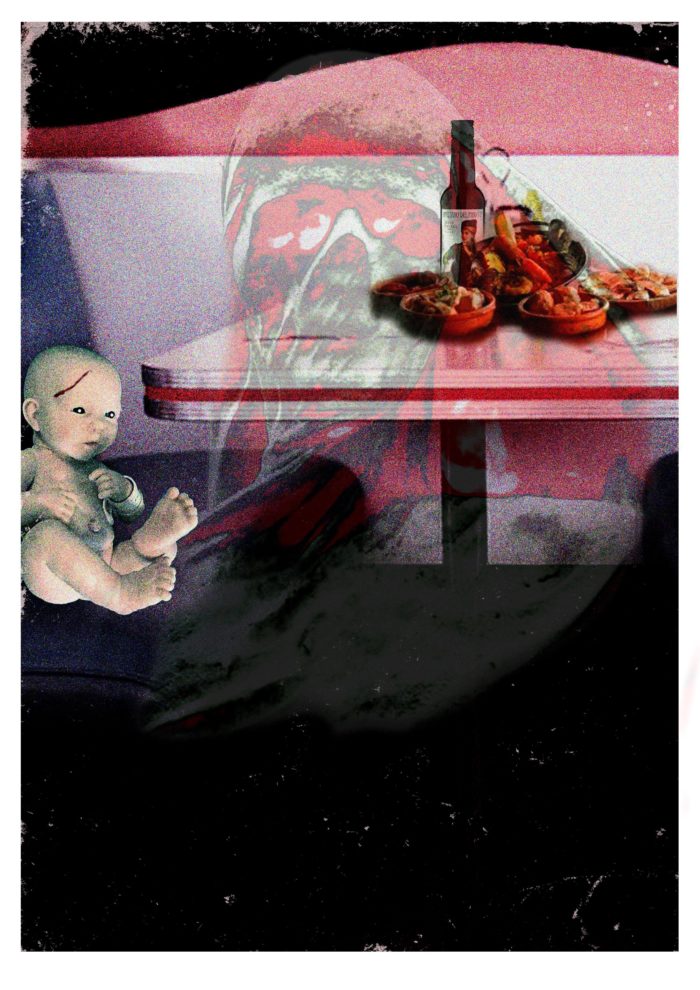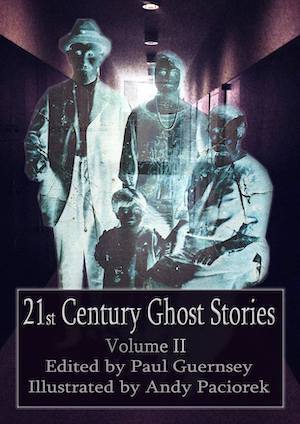HONORABLE MENTION, FALL 2018
The Ghost Story Supernatural Fiction Award
 Illustration by Andy Paciorek
Illustration by Andy Paciorek
BY ROBIN MAGINN
23.43 PM
Rosa was leaning against the wall outside while Fernando tossed black sacks into the bins at the back of the diner. She exhaled a plume of smoke and said, “You’ll see.”
“I’m a little scared, to be honest,” said Fernando.
“Scared?” Rosa cackled, a husky, dirty cigarette-laugh. “Don’t be scared. Not unless you need to make rent money.”
Holding the door open, Fernando frowned at her, his ruddy face puzzled. Rosa made a money gesture with her thumb and forefinger.
“The dead don’t tip,” she said, dropping the cigarette to the ground just before she walked back inside.
There was one customer left, a tattooed English trucker who didn’t speak much Spanish. He was still eating when Rosa began to hover around him, aiming to make him uncomfortable enough to leave. It was a skill she had.
The trucker had been a semi-regular over the last few months, working the routes between Seville, Granada, and Almeria, she assumed. The diner was one of many along the road to Almeria, and was surrounded by sparse scrubland with the Sierra Nevada mountain range looming wide behind it.
The Englishman made a show of finishing slowly, scrunching his napkin and staring out the window into the darkness, as Rosa hummed with increasing volume. Eventually, he threw a few Euros on the table and walked out. He paused at the door as if to say something, but Rosa ushered him out into the warm August night, flipped a sign to say “Closed” and locked the door behind him.
00.09 AM
Maria poked her head out the back office door, asked Rosa to put on some fresh coffee for them all, then disappeared again. Rosa raised her eyebrows at Fernando until he went into the kitchen to put on the coffee.
There were only four of them in tonight, although on the floor would just be herself and Fernando, her young trainee and a distant cousin. He had been expelled from the University of Seville two months earlier, and still seemed shell shocked by it. He had been working at the diner for the last few weeks, and was forgetful at times, but he was learning. Tonight would be a real test for him.
In the kitchen, she could hear Javier working, rapid thuds as his knife hit the chopping board, prepping for the night ahead. Rosa had worked in the diner for about five years, Javier four, but if pushed she wouldn’t be able to say she knew much about him. He didn’t talk a lot, but sometimes shared a cigarette break with her outside in silence. He cupped his cigarette in his hand when he smoked. Rosa had read once in a magazine that this was a sign someone had been in prison. She didn’t know if it was true, but associated the gesture with it nonetheless.
Finally, Maria, the diner owner, would be present, but she would be no help tonight. Nights such as these she was especially distracted, and had her own purpose.
A bell over the door chimed. Then, though it was still locked, the door opened, and she saw Fernando jump. A twenty-something man walked in and took a seat at a booth. As he passed them, Rosa could see the side of his face was glistening red, torn tissue and sinew, an open hole in his cheek showing his gum and broken teeth.
She prodded Fernando and said, “It’s your table.” As he started to move, she held his arm briefly and added, “Don’t let him order the soup or it’ll be messy.”
She watched Fernando tremble as he approached the table. He composed himself just in time, and the man at the table said, almost in a sigh, “Pan con tomate.” With haste, Fernando returned to the service window, and gave Javier the order. He looked to Rosa.
“Popped your cherry,” she said, and clapped him on his upper arm. Over his shoulder, she saw Maria come out of the office and sit with the man at the table. She talked quietly for a few moments, and then the man shook his head slowly. Maria nodded at him, and left.
The front door opened, and more of the dead arrived.
01.13 AM
It was getting busy and loud. A naked young couple were dancing happily in the middle of the floor, their drowned bodies blue-grey and bloated.
Rosa was carrying a tray of empanadillas, higaditos al jerez, and pulpo a feira to a table when she slipped and almost dropped the food. The floor was slick with blood. She steadied herself and delivered the food to the table successfully before rounding angrily on the diner. It was Fernando’s job to mop the floor. She looked for him. In one corner, Maria was sitting at a table talking to some of the dead; Javier was in the back, repeatedly ringing the small bell he used to let them know an order was ready.
Where was Fernando?
The dancing couple waltzed out of the way and she saw him standing in front of an empty booth. She stomped over, and as she drew near, she could hear a high-pitched whimper.
The booth wasn’t empty, she saw finally. Lying across one of the seats was a crying baby. He was so small, a newborn really, and there was a bright red scar bisecting the top of his head.
She looked at Fernando and saw he was weeping.
“What should I do?” he said.
She pushed past him and said, “You comfort a crying baby.” She picked up the child and held him tight. As she did, she recalled holding a small body close to her like this once, years ago, and the memory threatened to overwhelm her. She pushed the image away quickly, knowing that it would return later, when she was alone and no one could see her tremble and cry. She rocked the baby and told Fernando to warm up some milk.
He didn’t move.
“What?” she asked.
“Can you give babies cow’s milk?”
She rolled her eyes. “Do you have a secret supply of breastmilk hidden somewhere? Just get some milk.” She gazed down at the small face, giving him a wide smile as she added, “It’s not like it’ll hurt him.”
03.28 AM
She stood with Fernando waiting for Javier to finish up a large order.
“I read once about Chinese ghosts,” said Fernando. “Hungry ghosts.”
Rosa stared at him.
“In China,” he added, by way of explanation. “They have a festival. They hold a big feast for them.”
“For who?”
“The Chinese ghosts. The hungry ghosts.”
The bell dinged, and several plates of paella slid into view. They both turned and Javier was looking through the service window at them.
“What the fuck has China got to do with anything?” he said.
Fernando didn’t reply, just took his plates and ran off.
“You scare him,” said Rosa as she turned back to Javier, but he was gone from the window and she could hear him clattering in the kitchen.
04.21
She was out the back on a cigarette break when she heard someone clear their throat, and she squinted into the darkness until she saw who it was.
“Why don’t you come in?” she asked the figure.
“I can’t.”
“She’s asking everyone about you again. Alejandro, just come inside. Just once.”
“I can’t. I can’t forgive her yet.”
“You’re dead. Let it go.”
“I want to. But I can’t.” The figure paused and then asked, “How is she?”
Rosa exhaled cigarette smoke in one short blast. “She misses you. She’ll always miss you. Just come in. Even for a minute. Let her see you.”
“I can’t. I wish it was different. But it’s not.”
“Fine,” said Rosa. “Be like that. Watch from the fucking window as usual.”
She flicked away her cigarette in the direction of the figure, walked briskly toward the diner, and saw Fernando watching her from the bins. She put a finger to her lips and guided him back inside.
05.47
As the sun came up, one by one the dead trickled out. Some left money on the table behind them, but most did not.
None left a tip.
When the last of them left, Rosa flipped the sign to “Open” again, and unlocked the door. She looked around the restaurant. Maria was asleep with her head on a table as Fernando cleared up. She gave him a hand. When they finished, she signalled him to join her outside, and took a pot of coffee out with her.
The air was fresh as they watched dawn break. A few metres away was Javier, drinking from a bottle of sherry, but he didn’t acknowledge them.
They all sat in silence for a while and then she patted Fernando’s arm.
“You made it. Well done,” she said.
“Who were you talking to earlier? Out back?”
She didn’t look at him as she said, “Alejandro. Maria’s husband. Died a few years ago.”
“What happened?”
She shook her head. “Another time.” She sipped her coffee. “Once, on one of these nights, a woman told me what it was like. Being dead, I mean. She said it was like the moment just before an epiphany. But only that moment, never being able to make that leap. Just frustration. You never move on. How you feel when you die . . .”
She looked into her coffee cup, scrunched up her face, and poured the last of it out onto the ground.
 Robin Maginn is an Irish writer who lives in London. He has had several short stories published in print and online, including with Albedo One and Syntax & Salt, and was shortlisted for the 2010 Aeon Award, placing third.
Robin Maginn is an Irish writer who lives in London. He has had several short stories published in print and online, including with Albedo One and Syntax & Salt, and was shortlisted for the 2010 Aeon Award, placing third.

